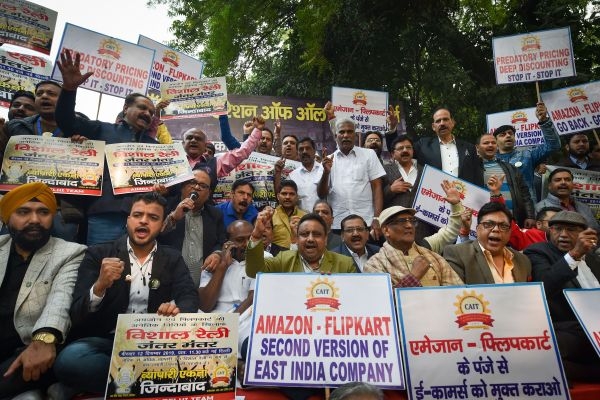(ATF) Thousands of angry Indian traders held an online summit on Thursday with trade associations and politicians to protest against Amazon and Walmart-owned Flipkart, for employing unfair trade practices and distorting the local retail market.
The summit highlighted the various challenges they face and the grievances they hold against multinational ecommerce retailers in a sign of escalating tensions between smaller Indian traders and global ecommerce giants.
“Amazon and other multinational ecommerce retailers have made success impossible for small sellers and retailers. And the objective of the event is to bring out the grievances and challenges facing small traders selling on e-commerce marketplaces run by multinational players, as well as create awareness around policy loopholes which are being exploited by them,” an organiser said.
Amazon, meanwhile, is organising a virtual summit in India named “Smbhav”, which phonetically means “possible” in Hindi, to showcase opportunities offered by the US firm to get small businesses to expand and sell online.
Trader groups representing 600,000 sellers titled the summit “Asmbhav”, or “impossible”, including an award ceremony to pin the blame on those who they think have hurt their businesses.
PREFERENTIAL TREATMENT
Indian traders, who are a crucial part of Prime Minister Narendra Modi’s support base, have long alleged that Amazon and Walmart’s Flipkart benefit a few big sellers and that the companies engage in predatory pricing that harms their businesses.
“The American e-commerce giants (Amazon and Flipkart) are destroying and devastating the smaller offline retail trade market by employing all kinds of malpractices including causing huge GST and income tax revenue loss to the government. Their predatory business practices are forcing us to shut down,” an aggrieved small trader attending the summit said.
Weeks back, Amazon India faced another challenge when a sensational Reuters report, based on internal documents dated between 2012 and 2019, revealed how Amazon was using a secret strategy to dodge India’s regulators and help a small group sellers prosper with discounted fees, and using them to avoid regulations.
“The event (summit) marked the first ever coordinated attempt by India’s offline and small online retailers’ associations against alleged unfair trade practices by e-commerce platforms such as Amazon and Flipkart,” MM Sharma, a competition lawyer heading the antitrust practice at the law firm Vaish Associates told ATF.
The traders have accused the online retail giants of offering deep discounts, controlling inventory, having exclusivity of products and maintaining a preferential seller system.
The companies, though, say they comply with all laws and add that as a third-party marketplace where sellers offer their products to customers for sale, small sellers have complete discretion to decide what products to sell and at what prices.
REGULATOR NEEDED
Over the past six months India though, has tightened regulations for online retailers, forcing companies such as Amazon and Walmart to restructure their businesses and withdraw some items put on sale.
India has also proposed a new draft policy recently, that restricts foreign-owned online retailers by calling for data to be stored locally and for more data centres and server farms to be located within the country.
These moves, experts say, could boost Indian e-retailers and high-tech companies at the expense of foreign competitors, who would see their costs rise.
But the protesters say these moves are not enough.
“Unless the (country’s) competition law relating to abuse of dominance is suitably amended to include ‘attempt to dominate’, and the government comes out with a specific policy to regulate these players along the European Union’s Digital Markets Act, we will just continue to debate and the e-commerce giants will continue to exclude rivals and exploit small vendors circumvent the loopholes in the law and policies,” Sharma said.
He said the dynamics of the digital market are such that the concept of ‘abuse of dominance’ results in several enforcement gaps in preventing enterprises that seek to dominate markets.
Indeed, the storm of discontent among brick-and-mortar businesses over e-commerce platforms has led to a series of cases being filed before the Competition Commission of India (CCI).
Until recently, most of these cases were dismissed since, individually, no digital entities can be held to be ‘dominant’ as per the definition of the term due to intense competition in their markets.
SCORCHING GROWTH
Meanwhile, Amazon revealed scorching post-Covid growth in India, saying last week that it has enabled exports of $3 billion worth of Indian-made goods and created over a million local jobs since it began operating in the country a decade ago.
And the company says it has generated $1 billion in revenue and created 300,000 jobs since January 20.
About 250,000 new sellers have joined Amazon.in over that period and more than 50,000 offline retailers and neighbourhood stores are now on the platform, the company added.
The company is also on track to fulfill commitments made by Jeff Bezos in January 2020: to digitally enable 10 million businesses, handle e-commerce exports worth $10 billion and create one million additional jobs in India in the five years to 2025.
With reporting by Reuters.
























